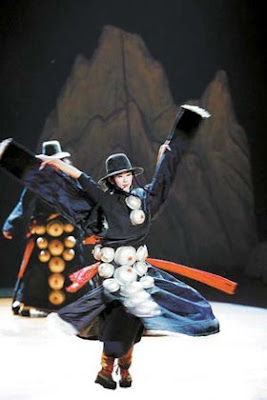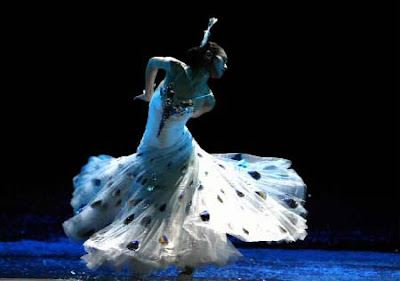
November 26, Thursday night
I have already attended three dance concerts in the last 4 days. I was writing my review on Dynamic Yunnan and had to look up the title of Yang Liping's latest dance show. When I surfed on to the ticketing site piao.com.cn, I saw that there were still cheap tickets available for the Sunday afternoon matinee. I wondered whether I would regret not watching her dance now, as she is almost 50 yrs old and will likely not be dancing on stage for too much longer. I call the ticketing agency and they tell me that there are round 50 tickets left at that price. The show was opening tonight at the Poly Theatre. I decide to go on an adventure and try my chances with the scalpers. I took 200 yuan cash with me and if I couldn't get a ticket for that price, I'll go home and book a ticket for Sunday. Tickets for all other shows were sold out.
I got to the Poly Theatre at around 6:15pm which is still very early. I walk to the two scalpers I recognized as they shooed me away before and ask whether they have tickets for tonight's performance. They said they would have tickets at around 7:10pm and for me to return then. One of them recognizes me and I feign ignorance. I head towards McDonald's and walked until I found a cheap, but popular noodle joint close by. The wind was nasty this evening and I was not dressed warmly enough to be outside for too long.
I went back to the theatre and ran into another scalper, who would try to locate a ticket for me. As time wore on, I stood close by where the scalpers were trying to pawn off their tickets. They were wanting ridiculous prices of 400 & 500rmb. Of course, they were good seats but I just needed a seat. I asked for a ticket and then decided not to buy it. A couple standing by me was also trying to purchase a ticket. They only had one but needed another and I needed one. They suggested that they sell their ticket to me and go home. They told me that it would be best, they do not live far away so it was not a bother to go home and try for another performance. I bought their 280 rmb ticket for 200 rmb. I then find out that she is a retired Peking University professor of German. How amazing! I thank them profusely for the ticket.
I head on into the auditorium. I had a seat in the upper right box. I am excited to see what they have in store as now Yang has updated technology at her disposal. The stage has Tibetan prayer wheels and incense burning. Actors are turning the wheels and occasionally the horn is blown. The story line and translation of the songs are flashed on the side screens. I am able to read parts of it as I cannot read that fast yet. I am enclosing the outline of the program below found at http://www.piao.com.cn/en_piao/ticket_2028.html and will be inserting my comments in italics. Please observe the Chinglish!
-------------------
The newest work of Liping Yang, the most popular Chinese ethical dancer and choreographer Coryphaeus by Rongzhong Erjia, the legendary Tibetan singer
A splendid and soul-shocking ethical music banquet in Beijing after its 80 shows’ tour around other cities

About Tibetan Riddle/Enigma:
Tibetan Enigma is a painstaking works of Liping Yang and Rongzhong Erjia. It is an epic showing different styles of pure Tibetan colorful music and dance in different regions.
“The Tibetan people are born to be the master of dance and singing, I can’t learn all their unique skills,” said Yang. Therefore, she invented some Tibetan men and women to take part in this show. It is the first time for all these folk performers to walk out their hometown and daily lives. They will be a great surprise to the audience in the choreography by Yang.
I'm not sure how one is supposed to invent people ... but the invention is very convincing.
Tibet Enigma debuted in 2008 as an audial and visional banquet. Nonprofessional Tibetan performers will bring local color and amorous feeling of the Tibet. Meanwhile, the Tibetan folk music instruments and vocality like Tibetan guitar and Dafahao (a big-size music instrument used in a Buddhist mass) will be firstly used on the stage. Three thousand Tibetan local costume, accessories and treasures will be exhibited in the show. It took five years for the choreographer to create and perfect the show.
It is specially worthy of mentioned that the Tibetan farmers will playing the Tibetan guitar, singing the folk song and dancing the tap dance at the same time. It is the unique performance style of Tibetan people.
The story
The story of Tibetan Enigma is about an old Tibetan woman’s experience along her pilgrim journey. Tibetan lives, culture, customs, and religion are all exhibited to the audience by the song, dance and music instruments.
Audience will see Liping Yang’s totally new profile and dance as well as Rongzhong Jiaer’s romantic voices. It is a collection of Tibetan sing and dance, a fashion show of ethnic costumes, and music festival with one-hundred folk Tibetan artists. The production has been prepared by Liping Yang for five years. She will perform a fairy who leading the old woman to the pilgrim road.

Scenes
Scene I
Tibetan Guitar and Long-leave Dance
Tibetan Guitar by all actors
Long-leave Dance by all actors and actress
Leading Singer: Baimalaji Cairangnanjie
This is what I like most about Yang's work. She incorporates music, song and dance into her show. These people were not just performing, they were thoroughly engaged with what they were doing. It's hard to be distant when one is singing, dancing and playing an instrument at the same time. I enjoy it when dancers are accompanied live, especially when they accompany themselves. The long-leave dance is a form of tap dancing.

The women came on stage singing a song. It sounded really familiar to me and I then realized it was the same song the ladies sang at the Niu Tibetan Village which we visited. Isn't that amazing? Or they just have very similar songs. This song and dance brought back fond memories of our study tour.
Scene II
Trash Highland Barley and Lover antistrophe
Leading Dancer: Naimaer Gudehamu
Leading Singer: Rongzhong Erjiar

Yak Dance lead by Dadanzeng The yak dance was the most light-hearted of all the dances. The yak herder had a script and he would also give commands to the yaks. To make things interesting, there was only one female yak amongst the male ones. The singers in this portion were three women and their song was sung in close dissonant harmony (in 2nds almost the entire song).
Scene III: Trash Aga, Shower Festival, Costume Race Festival
Leading Singer: Cairangnanjie Yinzhoucao
Notes
Trash Aga: A strange dance from the saint labor of repairing Potala Palace
If I'm not mistaken this involved clapping their hands together, followed by full prostration and is definitely religious in nature.
Shower Festival: It is an annual festival in Lunar Tibet Year when Tibetan women will have a shower in saint lake.
Costume Race Festival: It is a festival when the Tibetan youth will compete with their costumes and accessories. On the festival, these young boys and girls will have their most luxuriant gaudery on. For Tibetan people, the gaudery is the symbol of richness. The most expensive assets are ceremonious costumes and accessories.
Scene IV Nirvana Dream
Programs
1. Pilgrim
2. Tibetan Guitar
3. Long-leave Dance
4. Trash Highland Barley The dance was by the young people and they used their brooms as rhythmic instruments.

5. Lotus Drolma (Solo by Liping Yang)The crowd gives Yang a warm welcome as this was her first appearance of the evening. She is dressed like a Bodhisatva and dances on a lotus platform. Her dance movements are similar to the Moon Dance and the Peacock Dance. It was amazing to watch her dance and see what an excellent flexible dancer she is. I was glad I brought my binoculars with me as I watched her closely for the whole dance.

6. Yak Dance (reprise)
7. Song: Pilgrim, King Gear (Sing by Rongzhong Erjia)
8. Trash Age

9. Costume Race (Lead by Liping Yang) This was similar to the water dance in Dynamic Yunnan. Yang is the lead dancer in the center of an inverted triangle. The rest of the dancers are male.

In this dance, Yang's graceful actions are replaced by energetic street dance style movements. The dance is aptly name "Black Hat".
10. Nirvana (Drolma by Liping Yang ) Yang comes out one more time and dances something similar to the nirvana dance.
Casting
Art Director/ General Choreographer/Leading Actress: Liping Yang
Producer/ General Executive/Leading Actor: Rongzhong Erjia
Choreography/Leading Actress: Sun Flower
Stage Design: Jiangtao Luo
Music Director/ Music Executive: Xiao Pang
-----------
At the end of the show, Rongzong Erjia introduces all the main dancers of the show. He leaves for the finale of the show and then when all the dancers are on stage, he acknowledges Yang. The audience claps and waves to the performers fondly. I can see them hug and spin each other on stage. They are very happy and proud of their successful debut in Beijing.







